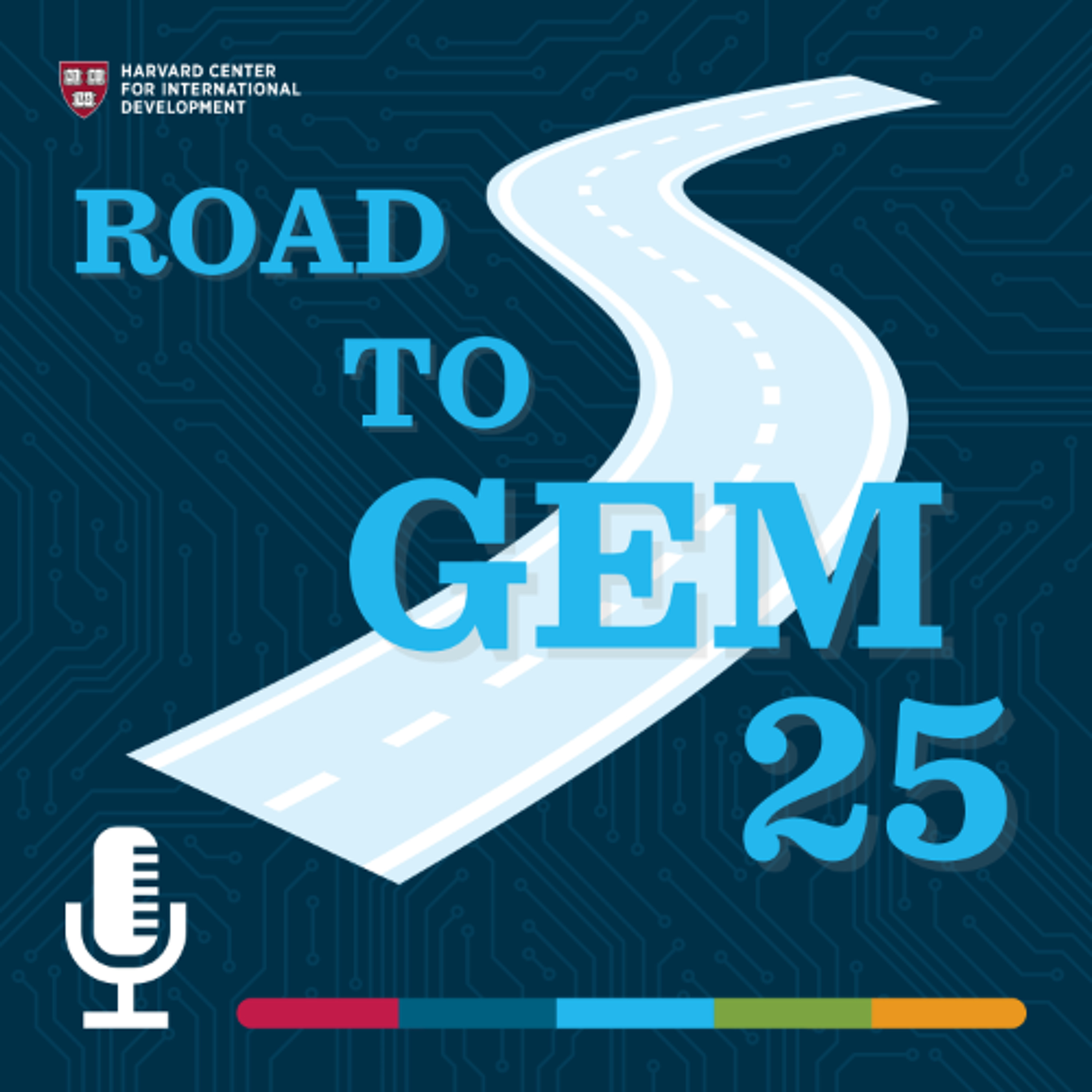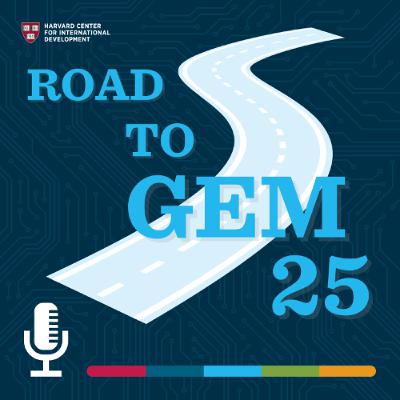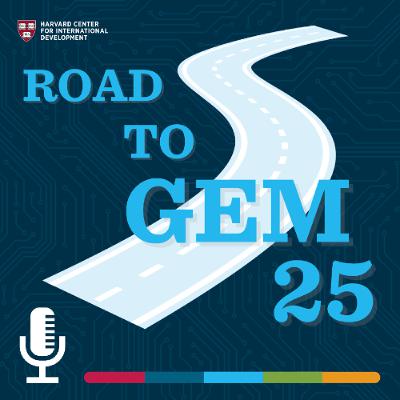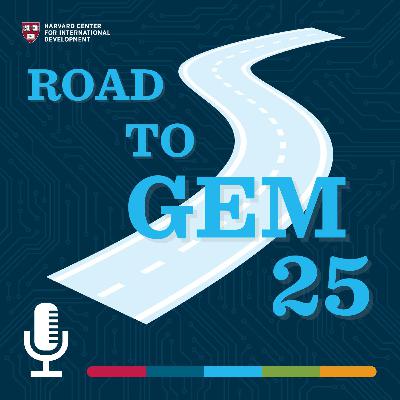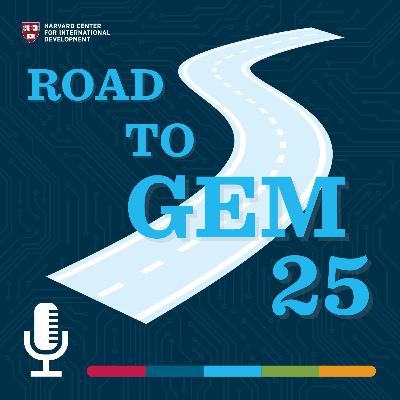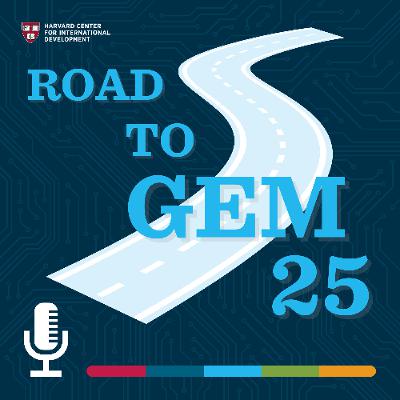Discover Harvard Center for International Development
Harvard Center for International Development

Harvard Center for International Development
Author: Harvard Center for International Development
Subscribed: 1,977Played: 12,362Subscribe
Share
© All rights reserved
Description
Incredible progress has been made throughout the world in recent years. However, globalization has failed to deliver on its promises. As problems like unequal access to education and healthcare, environmental degradation, and stretched finances persist, we must continue building on decades of transformative development work.
The Center for International Development (CID) is a university-wide center based at the Harvard Kennedy School that seeks to solve these pressing development problems—and many more.
At CID, we believe leveraging global talent is the key to enabling development for all. We teach to build capacity, conduct research that guides development policy, and convene talent to advance ideas for a thriving world. Addressing today’s challenges to international development also requires bridging academic expertise with practitioner experience. Through collaborative, in-country partnerships, CID’s research programs, faculty, and students deploy an analytical framework and context-dependent approaches to tackle development problems from all angles, in every region of the globe.
The Center for International Development (CID) is a university-wide center based at the Harvard Kennedy School that seeks to solve these pressing development problems—and many more.
At CID, we believe leveraging global talent is the key to enabling development for all. We teach to build capacity, conduct research that guides development policy, and convene talent to advance ideas for a thriving world. Addressing today’s challenges to international development also requires bridging academic expertise with practitioner experience. Through collaborative, in-country partnerships, CID’s research programs, faculty, and students deploy an analytical framework and context-dependent approaches to tackle development problems from all angles, in every region of the globe.
185 Episodes
Reverse
In the final episode of Road to GEM, Harvard Kennedy School MPP candidate Slavina Ancheva speaks with Dr. Flavio du Pin Calmon, Associate Professor at Harvard SEAS, about the intersection of artificial intelligence, equity, and global development. Together, they explore how AI technologies can both bridge and deepen digital divides — especially in low-resource and underserved regions.
Dr. Calmon shares insights from his research on fairness, privacy, and reliability in machine learning systems. The conversation highlights critical challenges in ensuring that AI tools are not only effective but also ethical and inclusive. They discuss bias mitigation, the importance of diverse data representation, and the ways in which technical design must align with social and policy objectives.
For listeners working at the crossroads of tech, policy, and justice, this episode offers a nuanced look at how to build AI systems that reflect and respect global realities.
Guest: Dr. Flavio du Pin Calmon, Associate Professor of Electrical Engineering, Harvard John A. Paulson School of Engineering and Applied Sciences
Host: Slavina Ancheva, Master in Public Policy Candidate, Harvard Kennedy School
In this episode of Road to GEM, Harvard Kennedy School’s Dr. Aarushi Jain speaks with Dr. Bhaskar Chakravorti, Dean of Global Business at Tufts University’s Fletcher School and Founding Director of Digital Planet, about the uneven global spread of artificial intelligence.
While AI holds promise for breakthroughs in healthcare, agriculture, education, and governance, Dr. Chakravorti sounds a note of caution: these benefits are far from equitably distributed. The conversation explores how AI is being built on deeply unequal data, why access and usage remain skewed across geographies, and how business models, environmental costs, and trust deficits might further widen the digital divide.
Drawing on insights from the Digital Evolution Index and years of work across policy, tech, and consulting, Dr. Chakravorti outlines six key divides shaping our AI future — data, income, usage, geography, production, and sustainability. He also shares tangible examples where AI can support smallholder farmers, underserved patients, and young learners, if deployed wisely.
This episode is a must-listen for anyone grappling with AI’s role in development, digital governance, and the urgent need to build inclusive systems before inequality becomes algorithmically entrenched.
Guest: Dr. Bhaskar Chakravorti, Dean of Global Business at The Fletcher School, Tufts University
Host: Dr. Aarushi Jain, Edward S. Mason Fellow, Harvard Kennedy School
In this episode of the Road to GEM podcast, host Felicity Powell joins a panel of international development and education experts to explore how artificial intelligence could transform education and promote equity. As foreign aid declines and humanitarian challenges grow, the discussion highlights why education remains essential to global equity and revisits past technology initiatives to consider whether AI will help bridge—or deepen—the digital divide.
Guests: Dr. Rob Jenkins (Harvard Graduate School of Education, formerly UNICEF), Dr. Chris Henderson (Geneva Graduate Institute), and Ellen Eun (Program Specialist, UNICEF Learning Passport)
Student Host: Felicity Powell, Harvard Graduate School of Education
In this episode of Road to GEM, Harvard PhD Student and CID Affiliate Jasmin Higo
speaks with Jean-Martin Bauer, Director of Food Security and Nutrition Analysis at the
World Food Programme, about how AI is shaping the global response to hunger. With
over 700 million people facing chronic food insecurity—and food crises driven by
conflict, climate change, and economic instability—this conversation asks a pressing
question: can innovation keep pace with the complexity of today’s hunger challenges?
They explore how AI is being used to anticipate emergencies, improve decision-making,
and reimagine humanitarian response. The conversation also touches on the ethical
limits of technology in fragile settings, the shift from rural to urban hunger, and what the
future holds for global food systems.
Whether you're interested in technology, development, or humanitarian work, this
episode offers timely insight into how AI is being deployed—and questioned—in the
fight against global hunger.
In this episode of Road to GEM, we explore the transformative role of artificial intelligence in urban planning and climate resilience. Jennifer Hotsko and Betty Chemier from UNDP’s Accelerator Lab in Panama join host Giovanna Lia Toledo, Master in Urban Planning candidate at the Harvard Graduate School of Design, to share real-world projects where AI is being used to visualize climate risks, engage communities in participatory planning, and support more adaptive and equitable cities.
From ethical considerations to practical applications, the conversation offers grounded insights into how emerging technologies can strengthen urban futures. Whether you’re a planner, technologist, or simply curious about the intersection of innovation and sustainability, tune in to discover how AI is not just a tool—but a catalyst for building inclusive, climate-resilient cities.
Guests: Jennifer Hotsko, Head of Exploration at UNDP’s Accelerator Lab in Panama | Betty Chemier, Head of Experimentation at UNDP’s Accelerator Lab in Panama
Student Host: Giovanna Lia Toledo, Master in Urban Planning, Harvard Graduate School of Design
Artificial Intelligence is transforming humanitarian aid—but what does responsible, community-centered innovation really look like? In this episode we explore how AI is being applied across CARE’s work in humanitarian and development contexts, from real-time needs assessment to amplifying women’s voices during crises.
Emily Janoch, with nearly two decades of experience in systems design and evidence-based learning, shares how CARE is using AI to drive dignity-focused development. Joining her is Kalkidan Lakew, whose work emphasizes the importance of data-driven storytelling and community-led response. Together, they shed light on the challenges of bias, access, and misinformation in AI—and what it means to use this powerful tool ethically and inclusively.
Whether you're an AI enthusiast, a development practitioner, or simply curious about the intersection of tech and global impact, this conversation offers grounded insights into what “AI for good” really means in practice.
Guests: Emily Janoch, Associate Vice President for Thought Leadership and Design at CARE | Kalkidan (Kal) Lakew, Program Coordinator at CARE
Student Host: Ritul Madhukar
How is AI reshaping Africa's tech landscape? In this episode, Marcelle N. Momha explores this question with Dr. Barbara Glover (African Union Development Agency-NEPAD) and Dr. William Wasswa (Mbarara University of Science and Technology). They discuss the role of AI in tackling African challenges, highlighting projects like Microsoft's investments and AI-driven healthcare innovations. Discover how Africa is poised to transition from an AI consumer to a global tech leader. Whether you're interested in AI or Africa's future, this episode provides valuable insights into the continent's digital transformation journey. Join us for a deep dive into Africa’s AI potential.
Guests: Dr. Barbara Glover - African Union Development Agency-NEPAD | Dr. William Wasswa - Mbarara University of Science and Technology
Student Host: Marcelle N. Momha - Harvard Kennedy School
AI is reshaping global development—but how can it be harnessed to address challenges in governance, decentralization, and inclusion? In this episode, we dive into the transformative potential of AI with Pritham Raja and Chinasa T. Okolo, who explore the intersection of AI, policy, and global equity. From using AI to bridge gaps in local governance to the power of smaller, more accessible language models, they discuss the innovations shaping the field. Whether you're an AI enthusiast, a development practitioner, or just curious about the future of tech in low-income countries, this conversation offers valuable insights into the evolving landscape of AI for public good. Tune in for a thought-provoking discussion on the opportunities—and responsibilities—of AI in shaping a more inclusive world.
Guests: Pritam Raja - JPAL | Chinasa T. Okolo - Brookings Institute
Student Host: Lili Vessereau
In this episode, we delve into the complex dynamics between mega-sporting events and human rights. Vijay Simhan from Humanity United offers valuable insights into funding strategies for narrative, research and advocacy, drawing from the foundation's work in the 2022 FIFA World Cup in Qatar. Thays Prado from the Center for Sport and Human Rights emphasizes the crucial role of centering women and gender minorities in stakeholder engagement throughout the event lifecycle.
Whether as spectators, players, coaches, or executives, sports bring people together and have the potential to drive improvements in education, health, and labor across the globe. In this episode, we explore the transformative power of sports in community building and international development. Mariana Behr Andrade, Global Sports Initiative Fellow at Harvard University’s Weatherhead Center, who spearheaded impact initiatives for the Rio Olympics, discusses how sports can improve education outcomes, while legendary hockey coach Digit Murphy highlights gender representation in athletics.
In this episode, we’re diving into the power of narrative in international development. More than just storytelling, narrative has become a critical tool—from shaping program design to influencing funding decisions. Donors and practitioners alike are recognizing the role of narrative in advancing sustainable development goals. But what exactly does "narrative" mean in this context, and how can we use it effectively to create real change? We'll explore how narrative can be both a means and an end in the push for a more equitable and sustainable world. Joining us to unpack this are Mandy Van Deven, founder of Both/And Solutions and co-lead of Elemental, Chiara Cattaneo, co-lead of Elemental, and Paco Camacho, Director of the Law and Human Rights Program for the Asia Foundation in the Philippines.
In this episode, we dive into reproductive justice—exploring abortion access in Latin America and menstrual rights in India. How can we advance reproductive rights while navigating religious, intergenerational and cultural landscapes? We’ll discuss the intersections of labor, health, and policy. First, we speak with Paula Avila-Guillen, human rights attorney and Executive Director at the Women’s Equality Center, about the ongoing fight for abortion rights in Latin America. Then, we head to India, where Ananya Chaocharia, founder of Paint it Red Foundation, walks us through the movement for menstrual rights.
In this episode, we explore the care economy, delving into the crucial roles of care for children, elders, and others from an economic perspective. Who is truly investing in care, and who benefits from these investments? We’re joined by Nancy Folbre, Professor Emeritus of Economics at the University of Massachusetts Amherst, who analyzes care as an intergenerational exchange and a vital investment. Following her insights, we’ll hear from Ana Fernanda Hierro, Technical Secretary of Consejo Nuevo León, who discusses best practices at the local level in the state of Nuevo León, Mexico.
In this episode, we unpack what “scaling up” truly means in international development—not just expanding for growth’s sake, but doing so with intentionality to maximize impact. We’re joined by Jossie Fahsbender, Senior Program Manager at IMAGO, and Siddhant Gokhale, Senior Knowledge Manager at IMAGO, co-authors of Scaling Up Development Impact alongside Harvard Professor Isabel Guerrero. Jossie and Siddhant share real-world examples of how this approach has empowered agents of change, discuss the challenges of scaling in diverse cultural contexts, and explore how community-centered solutions are shaping the future of development.
In this episode, we explore the dynamic relationship between education policy and human development in the Global South. Dr. Emiliana Vegas, a professor at the Graduate School of Education at Harvard University. She shares her wealth of experience and insights. From advocating for micro-inputs to promoting comprehensive support systems, Dr. Vegas offers valuable perspectives on the evolving landscape of education reform. Tune in as we delve into the crucial role of contextual understanding and collaboration with local leaders in designing effective, culturally relevant, and sustainable education policies. Hosted by Usama Mohammed, a student at Harvard's Graduate School of Education.
In this episode, we explore women's economic empowerment with Diva Dhar from the Bill and Melinda Gates Foundation, Varina Winder from the US State Department, and Wendy Teleki from the World Bank. Together, they share their unique approaches to addressing economic opportunities for women, discussing pivotal moments for women in low and medium-income countries, areas of progress, and existing gaps. Discover how inclusive economic growth for women fosters positive impacts on families and communities, along with insights into women's entrepreneurship. Hosted by Priyanka Varma, a student at the Harvard Kennedy School of Government.
In this episode of our Road to GEM24 podcast series, Javed Malik, Program Director of the Malala Fund in Pakistan, dives into the realms of education, governance, and development. Tune in to listen to discussions on the role of evidence-based policymaking, challenges in education delivery, and the imperative of gender-focused interventions. Hosted by Usama Mohammed, a student at Harvard's Graduate School of Education
Join us as we dive into strategies to foster investment in female founders, with a special focus on the Middle East and North Africa (MENA) region. Our guests, Katherine Coffman from Harvard Business School and Hela Cheikhrouhou from the International Finance Corporation, shed light on the barriers and disparities faced by female founders and advocate for gender-specific approaches to funding. Hosted by Alison Kim, a student at the Harvard Kennedy School of Government.
Dive into the vibrant LGBTQ+ movements of Lebanon and Mexico in our latest episode of "Zooming Into the LGBTQ+ Movement." Join us as we speak with two remarkable activists and entrepreneurs, Tarek Zeidan and Enrique Torre Molina. Tarek is the founder of Helem, the pioneering LGBTQ+ organization in the Arab world, while Enrique co-founded Colmena 41, an organization bridging entrepreneurship, advocacy, and narrative for the LGBTQ+ community. Stay tuned until the end to hear insights from all our guests on the future of international development in our "Zooming In and Out" segment. Hosted by Harvard Kennedy School MPA student, Evy Peña.
Join us as we zoom into the LGBTQ+ movement in Brazil and Kenya with Antonia Moreira (Atelier TRANSmoras Association) and Enosa Adera (Trans* Alliance). Antonia brings the power of fashion to the forefront, using it as a catalyst for advocacy and community building in Brazil. Meanwhile, in Kenya, Enosa confronts a legal landscape of criminalization, employing policy advocacy and representation to instigate transformative change. Evy Peña, HKS student, hosts this dynamic conversation uncovering the crossroads of identity, activism, and resilience.


